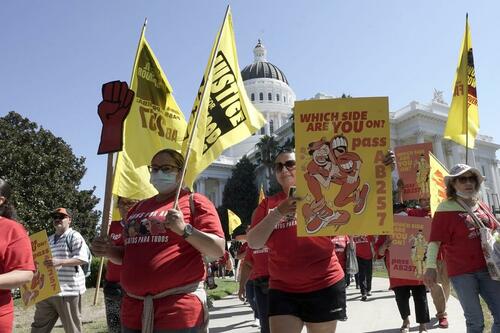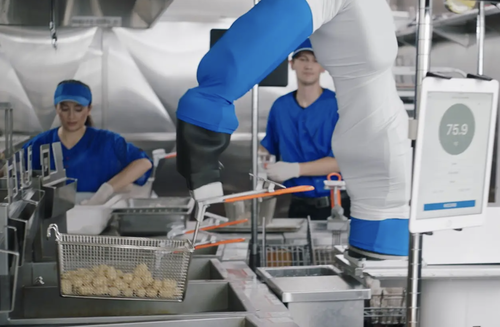California Senate Passes Bill To Create “Fast Food Council” With Wage-Setting Power
The California Senate on Monday voted to create a “Fast Food Council” that would have the authority to set minimum wages and issue safety, health and anti-discrimination regulations.
The 10-member council, which would include four worker representatives, four employer representatives and two state officials, would have the authority to increase California’s fast-food minimum wage to as much as $22 in 2023.
California’s minimum wage is $15 today, and is scheduled to rise to $15.50 on Jan. 1. The board — 40% of which would be worker reps — would thus be empowered to institute a 42% minimum-wage hike. Thereafter, the cap would rise by the smaller of the consumer price index or 3.5%.

Any California store that’s part of a chain with at least 100 outlets nationwide would be subject to the Fast Food Council’s edicts. There are over a half-million fast food workers in the state.
If enacted, it would be the first law of its kind in the United States. Putting workers’ representatives on a wage-setting government board could begin reshaping the way compensation is negotiated in America.
“The bill could herald an important step toward sectoral bargaining, in which workers and employers negotiate compensation and working conditions on an industrywide basis, as opposed to enterprise bargaining, in which workers negotiate with individual companies at individual locations,” writes Noam Scheiber at The New York Times.
The council’s wage power would have ripple effects throughout California’s economy, as employers in other low-skill industries would be forced to compete with compulsory rates paid by fast-food companies.
Of course, further minimum wage hikes will also encourage fast food outlets to replace workers with machines, and higher wages will mean higher fast food costs for Californians — including many of those at the lower end of the economic ladder.

Leftists were exuberant. “We made history today,” Service Employees International Union President Mary Kay Henry told the Associated Press. “This legislation is a great leap huge step forward for workers in California and all across the country.”
It’s “one of the most significant pieces of employment legislation passed in a generation,” gushed similarly enthusiastic Columbia Law School professor Kate Andrias, who called it “a great leap huge step forward for some of the most vulnerable workers in the country, giving them a collective voice in their working conditions.”
Each of the California Senate’s nine Republicans voted against the measure, known as the Fast Act, as did three Democrats. Speaking against the bill, Republican Senator Brian Dahle — who is also the nominee for governor — said, “There are no slaves that work for California businesses, period. You can quit any day you want and you can go get a job someplace else if you don’t like your employer.”
The state assembly is expected to pass the bill by Wednesday, but governor and likely presidential candidate Gavin Newsom hasn’t made his position on the final bill known. Earlier, his administration expressed concern that the general concept would create “a fragmented regulatory and legal environment.”
His administration opposed an earlier version that would have given the proposed Fast Food Council even more power. It would also have treated restaurant chains as joint employers of franchisee’s employees, leaving them vulnerable to liability for labor law violations.
The fast food industry worked hard to get those measures stripped from the bill. “This is the biggest lobbying fight that the franchise sector has ever been in,” Matthew Haller, president of the International Franchise Association, told The Wall Street Journal.
That’s not to say they’re at all happy with the final product. “We are pulling the fire alarm in all states to wake our members up about what’s going on in California,” Haller separately told The New York Times.
Tyler Durden
Tue, 08/30/2022 – 22:25
via ZeroHedge News https://ift.tt/kY3IfxN Tyler Durden